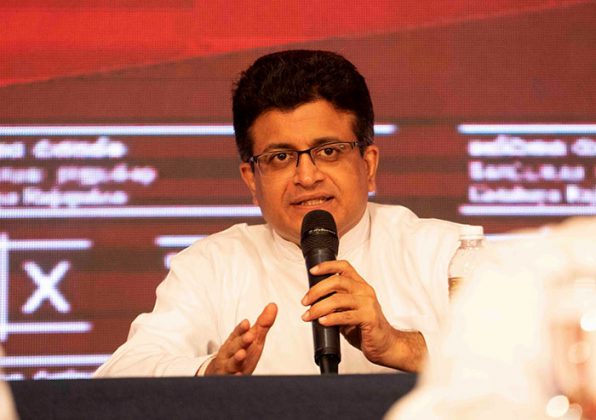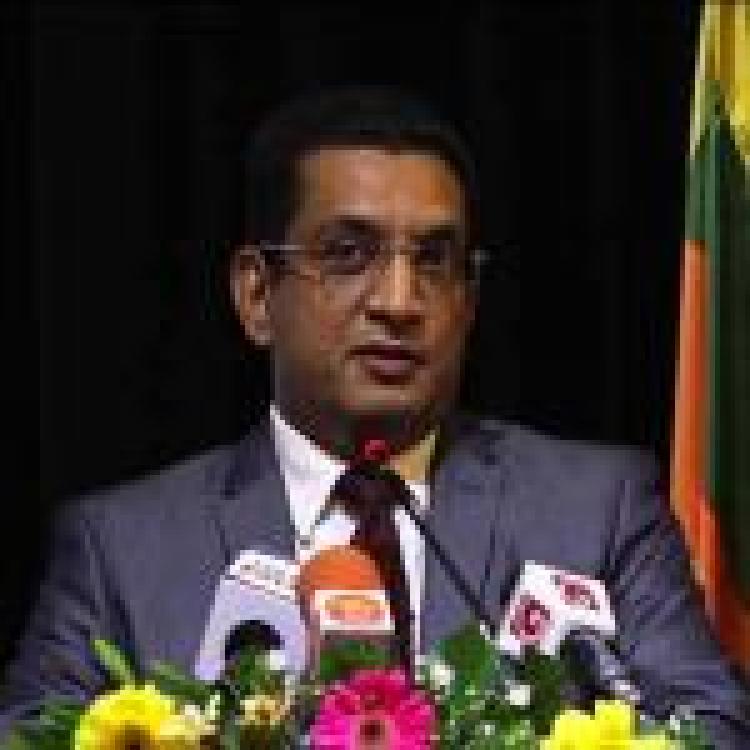
Sinhala extremist lawmaker Udaya Gammanpila submitted a Private Members Bill to the Sri Lankan Parliament, which seeks to remove police powers that should be granted to provinces under the 13th Amendment to the constitution, warning that “foreign nations” may end up funding “Tamil separatists” if it was enacted.
Gammanpila, an ultra-nationalist told reporters in Colombo last week that the biggest threat “to national security is the provision of police power to the provinces.”
The 13th Amendment was established in 1987 as part of the Indo-Lanka accord and created the system of Provincial Councils, promising greater devolution of land and police powers to a merged North-East. However, Sri Lanka has failed to implement the accord.
“If there is a separatist war in the future, it will be between the police force in the North and the Sri Lankan army,” Gammanpila who sits in the Opposition said. “Both will be legitimate defense forces.”
Elaborating further Gammanpila stated that during the armed conflict with the Liberation of Tamil Tigers Eelam (LTTE), the movement was supported by various countries financially, through the supply of weapons and recognition of the struggle.
“All of this was done secretly,” he said. “But in future foreign nations that wish to support another armed struggle, can do so openly and publicly without hear of reprisal or hesitation.”
He went on to tell reporters that although this issue had been discussed in the past, no one had come forward with a suggestion of this nature and through this means. The Government Printing Department on Tuesday (13) gazetted the Private Members Bill, accessible here. The Bill will be presented to parliament on February 20 and thereafter two weeks will be devoted to receive objections.
“I am sure there will be members of the Tamil community who will wish to challenge this bill,” he said. “However once we have the approval of the judiciary, we will finalize this bill, which will be a permanent solution to a long-standing issue in this country.”
Reporters asked the MP if this bill would secure a two-thirds majority in parliament, to which he said that it would test the parliament’s resolve to pass such a bill.
“This is something that the whole country has been asking for, except for the Tamil separatists. Through this bill, we will know if we have more patriots or separatists in this country,” he said.
Gammanpila added that there have been calls to remove police powers from provincial councils as provided for by the India-backed 13th Amendment. However, the provision exists only on paper as the 13th Amendment has yet to be implemented in full. “Even President Ranil Wickremesinghe is supportive of an amendment to the constitution.”
In August last year, Minister of Foreign Affairs Ali Sabry speaking on the issue of granting police powers to the provinces said the Sri Lankan president is committed to the full implementation of the 13th Amendment, except for police powers.
Minister of Foreign Affairs M. U. M. Ali Sabry said that the government is looking to offer a solution which is fair for all citizens of the country. The Minister made these comments referring to the 13th Amendment to the Constitution and the devolution of Police powers. pic.twitter.com/nTqCCkbYVA
— DailyMirror (@Dailymirror_SL) August 2, 2023
“There is already a lot of debate about how the police force is politicized. Having a separate police force in each of the nine provinces or having nine chief ministers controlling the police with a single sitting minister is still being debated,” he claimed. “This will not only affect Tamil people. It will affect everyone. We must discuss what the implications are for the country”.
The 13th Amendment has consistently been rejected by the Tamil people as not being an adequate solution to the national question, as successive Sri Lankan governments have failed to fully implement the legislation.
Following his recent election as the leader of the Tamil Arasu Katchi (ITAK), Sivagnanam Shritharan told the Tamil Guardian in an exclusive interview that the 13 Amendment is not an adequate political solution to the Tamil national question.

